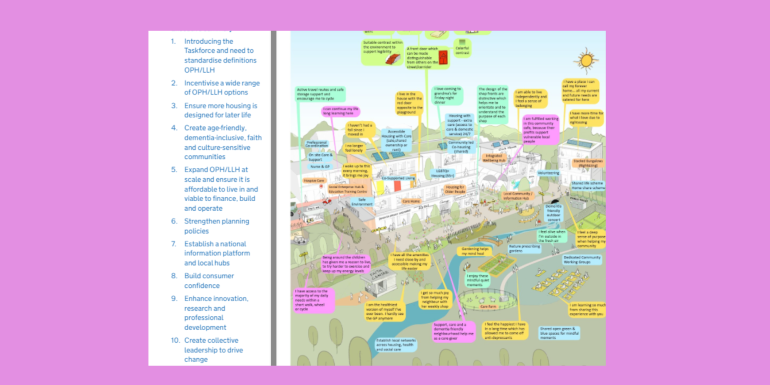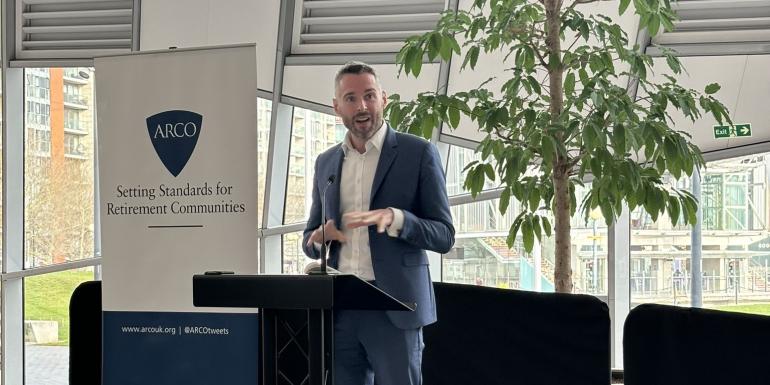Care Minister says Retirement Communities set to play major role in health and social care
JULY 11, 2019
Retirement Communities have a major role to play in meeting the housing and care needs of our ageing population. The Government is committed to helping deliver more of them and they will feature in the Social Care Green Paper when it appears.
These were the messages from Care Minister Caroline Dinenage MP to 500 leaders of the housing-with-care sector at ARCO’s What Next? 2019 Conference at Royal Horticultural Halls, London.
The Minister said housing-with-care (commonly referred to as Retirement Communities) has never played a more important role in health and social care, helping to keep older people healthier, more active and less lonely, as well as freeing up family homes.
Now that care homes are increasingly focused on end-of-life care, the Minister added that Retirement Communities fill the gap between living independently at home and care homes.
She stated that the Social Care Green Paper will outline the role operators can play and that the Government is committed to helping to expand the supply of Retirement Communities, looking at measures such as a clearer definition for planners and appropriate legal and regulatory frameworks which guarantees residents’ rights – something ARCO has been campaigning for since its inception.
These sentiments were echoed in a message from Housing Minister Kit Malthouse MP, who called on the sector to be ambitious in its expansion plans, particularly in the mid-market and that he expected local authorities to take much more account of the housing needs of older people in their local plans and in identifying suitable sites.
The conference was kindly sponsored by Platinum sponsor CBRE; Gold sponsors Badenoch and Clark and Trowers and Hamlins; Silver sponsors Castleoak, Carterwood and Nicol Thomas.
Other key speakers included Sir Muir Gray, Director, the Optimal Ageing Programme, who called for a change to the language around care to promote active ageing, suggesting ‘retirement’ becomes ‘renaissance’ and ‘care’ becomes ‘wellbeing’. Janice Chia, Founder and Managing Director, Ageing Asia Alliance also spoke of the different types of retirement facilities in South East Asia and the initiatives to encourage exercise through competitions and even gambling.
Sector leaders Nick Sanderson, CEO Audley Villages, Jane Ashcroft, Chief Executive Anchor Hanover, and Avnish Goyal, Chair of Hallmark Care Homes, also spoke or took part in panel discussions throughout the day along with many other experts.
Michael Voges, Executive Director ARCO, said:
“Today we heard a clear message that Government recognises the importance of our sector and wants – in fact needs – us to grow significantly over the coming years.
“We are delighted to hear that the Department of Health and the Ministry of Housing will work together to help increase supply, listening to ideas from the sector and unlocking our huge potential over the coming years.
“Our ambitious growth plans, which we refer to as Vision 2030, are already set to deliver billions of pounds of savings to the health and social care systems and to free up hundreds of thousands of houses – but we know we can go even further.”
“Our sector is ready to play a major role in tackling the housing and social care challenges at the same time. If the Government follows through on the commitments made today we will see an unprecedented boom in our sector over the coming decade. Hundreds of thousands of older people will benefit as a result.”
ENDS
For Further Information Please Contact
Gareth Lyon, Head of Policy and Communications, at garethlyon@arcouk.org or on 075350 88498
Notes to editors
- About ARCO: ARCO (the Associated Retirement Community Operators) is the trade association for operators of housing-with-care developments for older people. ARCO was founded in 2012, and is now comprised of 27 private and not-for-profit operators of Retirement Communities. ARCO represents approximately 50% of the Retirement Community sector. ARCO sets high standards, and all ARCO members must adhere to the externally assessed ARCO Consumer Code. ARCO does not represent the traditional retirement housing model where there are limited services and no care is available or care homes.
- About Caroline Dinenage: Caroline became Minister of State at the Department of Health and Social Care in January 2018 after serving as Parliamentary Under Secretary of State at the Department for Work and Pensions since June 2017. She was Parliamentary Under Secretary of State for Women, Equalities and Early Years at the Department for Education from July 2016 to June 2017 and was elected Conservative MP for Gosport, Stubbington, Lee-on-the-Solent and Hill Head in 2010.
- About Kit Malthouse: Kit was appointed Minister of State for Housing in July 2018 and was previously Parliamentary Under-Secretary of State for Family Support, Housing and Child Maintenance at the Department of Work and Pensions from January 2018. He was elected as Conservative MP for North West Hampshire in May 2015.
- About Retirement Communities: Retirement Communities typically consist of individual one or two bedroom flats or houses, located in a development with similar properties. Residents have access to a range of services and facilities, which will include optional on-site care, 24-hour staffing, and dining and leisure facilities, and may also include bars, gyms and craft rooms. Retirement Communities are also sometimes referred to as housing-with-care schemes, retirement villages, extra care housing, assisted living, or close care apartments. They sit in between traditional retirement houses (which have less extensive staffing and leisure facilities), and care homes, and can be in urban or suburban locations.
- About Vision 2030: Vision 2030 is ARCO’s vision for 250,000 people to be living in retirement communities by 2030. The vision sets out ten areas of work for the sector in order to achieve this. These are:
- Development of a clear customer proposition
- Effective self-regulation
- Enhanced health and wellbeing
- Intelligent use of technology
- Flexible models of tenure
- Sustainable funding streams
- Sector-specific legislation
- Comprehensive and robust data
- Clarity in the planning system
- A highly trained workforce
- Benefits of Retirement Communities:
- Meeting the needs of an ageing population: Older people need and want choice in their housing for later life. However, at present housing options for older people are limited. Retirement Communities are an important element of housing choice for older people. Developing the capacity of the Retirement Community sector is vital to ensuring that the UK’s housing market is fit to meet the needs of an ageing population.
- Promoting independence, security and wellbeing: Older people living in Retirement Communities are likely to experience lower levels of loneliness and social isolation. A 2014 study by the International Longevity Centre found that 82% of respondents in Retirement Communities said they hardly or never felt isolated, and only 1% often felt isolated.
- Reducing costs and encouraging more efficient use of resources: Residents in Retirement Communities are able to receive specialist care in their homes if needed, enabling them to return home from hospital earlier. They are also less likely to enter hospital. For example, one way in which Retirement Communities improve health is by preventing falls. Retirement Community properties are designed and built with adaptations to support independence and research shows that those living in these specialist homes are between 1.5 and 2.8 times less likely to have a fall than those living in homes without adaptations. This helps to reduce pressure on NHS services. A recent study found that NHS costs were reduced by 38% for those moving into Retirement Community housing and NHS costs for ‘frail’ residents had reduced by 51.5% after 12 months.
- Responding to the housing shortage: Older people moving to a Retirement Community will typically ‘downsize’, freeing up much needed and under-occupied family sized homes. If all those interested in moving into a retirement property were able to do so, research suggests that approximately 3.29 million properties would be released, including nearly 2 million three-bedroom homes.





